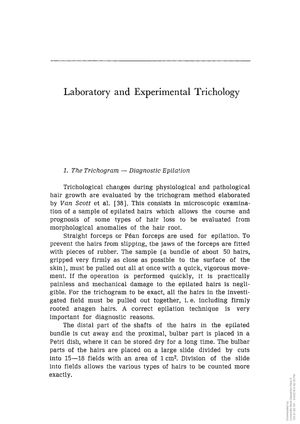Laboratory and Experimental Trichology
April 2015
in “
Current problems in dermatology
”

TLDR The document concludes that the trichogram is a useful tool for diagnosing hair loss and suggests semi-organ cultures for practical trichological research.
The document from 2015 details the trichogram method as a diagnostic tool for hair loss, which involves analyzing a sample of about 50 epilated hairs under a microscope to determine the health and phase of hair growth. It provides normal hair distribution percentages for different growth phases and classifies trichograms based on observed hair types. The document also examines the impact of hairdressing chemicals on hair's mechanical properties and describes methods to evaluate these properties, including the use of Schopper's apparatus and electron microscopy. Additionally, it discusses hair color classification and measurement, hair growth measurement techniques, and the use of 35S-cystine for autoradiographic evaluation. The document mentions hair tissue cultures and the challenges associated with them, suggesting semi-organ cultures as a more practical alternative for trichological research.




